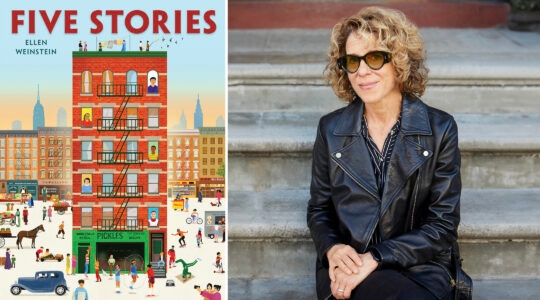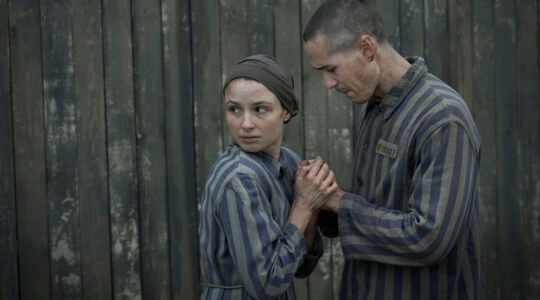BERLIN (JTA) – For the first time in her 47-year career, Barbra Streisand performed in Germany. Berliners loved her – and she gave them love back.
The event was a long time coming for the 65-year-old performer, who reportedly never wanted to set foot in the country responsible for the Holocaust. But standing onstage at the Nazi-era, open-air Waldbuehne Theater on Saturday, Streisand told some 18,000 fans she was “very happy to be here in Berlin, so happy to be here in your country. It’s been many years.”
Streisand proceeded to wow the crowd with a two-hour show of jazz, movie and show tunes – including “People,” “Somewhere,” “Memories” and “The Way We Were” – that had the audience practically swooning.
On Sunday, Streisand paid a private visit to the Jewish Museum Berlin after it was closed for the night. She was accompanied by her husband, the actor James Brolin, and two friends.
For weeks Berlin had been plastered with brown-and-gold posters of this proudly Jewish diva, whose paternal family hails from Austria.
Though she had never performed in Germany, Streisand introduced her film “Yentl” on a German TV show in 1984. This was her first tour on the European continent.
When the European tour was announced this spring, Germany at first was not on the list.
“We had some inquiries from people about whether this was a sign that Barbra is not touching German soil,” recalled Stephan Kramer, general secretary of the Central Council of Jews in Germany.
Her ultimate decision to sing here “shows her confidence,” he said. “I am not saying it is another step to normality, but she has a lot of fans in Germany.”
In 2004, when the planners of Berlin’s annual Jewish festival inquired whether Streisand would consider coming to Germany’s capital city, the answer came through her manager: She’d do it for $1 million.
“We didn’t know if it was just an excuse not to come,” said Berlin Tagesspiegel journalist Thomas Lackmann, who coordinated the 2004 event and invited someone else instead. “Because there was also the story that Barbra did not want to perform here because of the Holocaust,” said Lackmann, who is not Jewish.
When she finally did come this weekend, the crowd at the nearly sold-out arena appeared to be in a jubilant mood. Members of the 58-piece orchestra joined the audience in pre-concert “waves,” lifting their violins and flutes into the air.
At the concert, Streisand never specified her reasons for avoiding Germany in the past, nor has she given interviews on the tour. Instead, she spoke at the concert of Germany’s cultural legacy, mentioning Beethoven, Brahms, Bach, Wagner, Mendelssohn and Einstein.
Streisand said a line by Goethe always had inspired her: “At the moment of commitment, the entire universe conspires to assist you.”
Later, she offered a “prayer for tolerance, compassion and peace.”
While the high ticket prices raised eyebrows and ire in some cities along Streisand’s 10-concert tour route – for the Berlin concert, the cheapest seats went for about $200, and some tickets on the eve of the event fetched upwards of $1,400 – Berliners were willing to shell out the euros to hear the multiple Grammy Award winner.
Lackmann said he thought some non-Jews here were drawn to Streisand due to their philo-Semitic feelings.
They think of her as a survivor, “fighting and struggling and winning,” he said. But “for Jews in Germany and everywhere, she is a hero.”
The acoustics in the sunken arena were such that Streisand could hear every declaration of love from the audience – even from the topmost seats.
“I feel it,” she said to the audience at one point. “And I love you back.”
The Jewish girl from Brooklyn should not have been surprised by the reception, as she herself pointed out.
“Germany has always been – how do I say this? – you buy a lot of my records!” she said to cheers from the crowd.
The audience was studded with famous faces, including Israel’s outgoing ambassador to Germany, Shimon Stein, and Berlin’s mayor, Klaus Wowereit. Also present were members of the Berlin Jewish community – including former president Albert Meyer – who in the past had tried to bring the Jewish singer to perform here.
During the concert, Streisand read aloud and answered four questions from audience members, singing “Happy Birthday” to someone named Thorsten and answering a profession of love from Sven with a Brooklynese brushoff: “Tawk to ya lata sometoime?”
Brolin surprised her on stage with a giant dessert for their ninth wedding anniversary.
“I can’t believe it took me so long to come here, really,” the star said as the summer evening gave way to night. “Where did the time go? I always meant to come. And I haven’t left yet! But thank you all for waiting.”
At the Jewish Museum, Streisand spent two hours in the permanent exhibit in a private tour given by program director Cilly Kugelmann. At one point she played a tune she had composed on a grand piano that had been shipped to South Africa when its owner fled Nazi Germany in 1936.
In addition to the permanent exhibit, which tells the story of nearly 2,000 years of Jewish life in Germany, Streisand visited the Garden of Exile. She tested several interactive exhibits, including one that asks what objects an 18th century religious woman would have taken on a journey.
“She did that game and got quite a lot of them right,” museum spokeswoman Eva Soderman said.
The Bluthner piano Streisand played had belonged to a German Jew, Helga Bassel, whose daughter, Tessa Uys, donated the piano to the museum after learning its history. Bassel took her own life in 1969.
“Barbra Streisand saw the piano and heard the story about it, and then she sat down and played a little piece of music that she had composed herself,” Soderman said. “The museum was empty, of course. I bet a lot of people would have liked to have heard that.”





